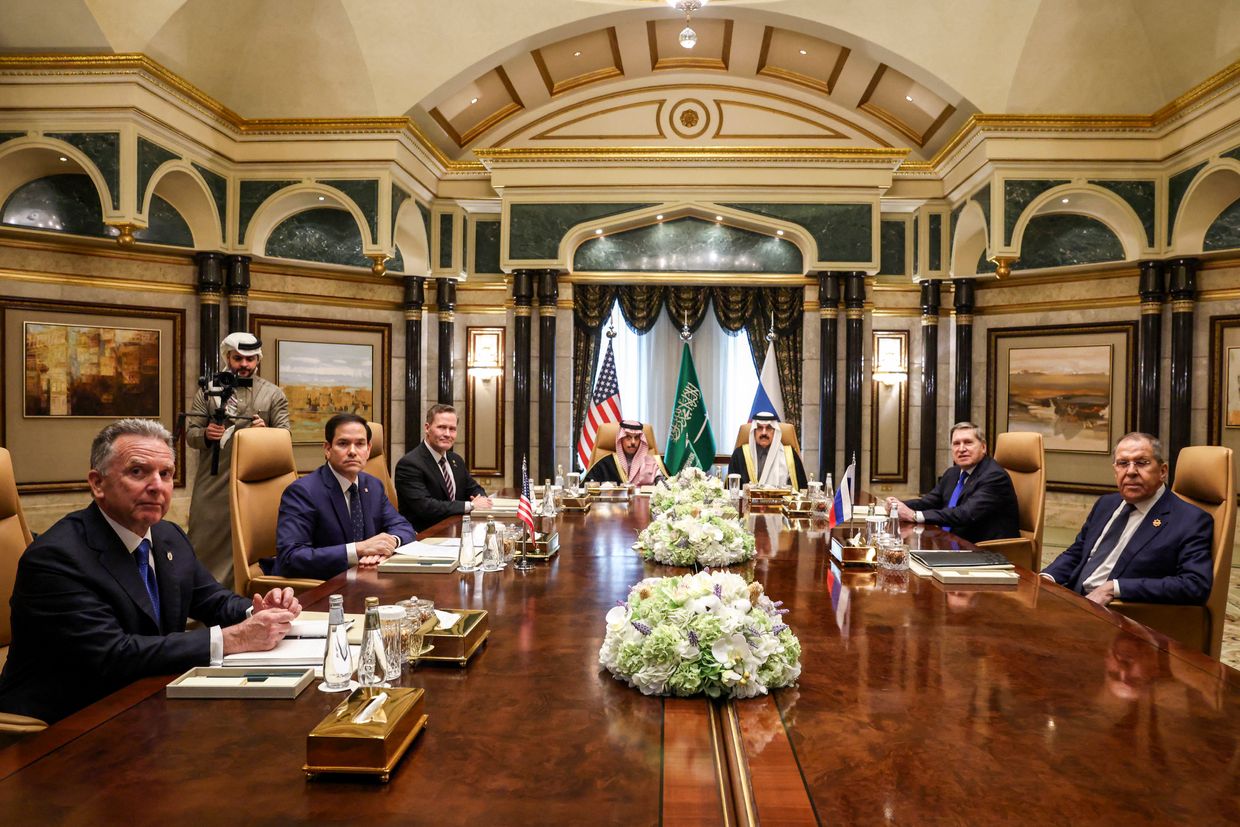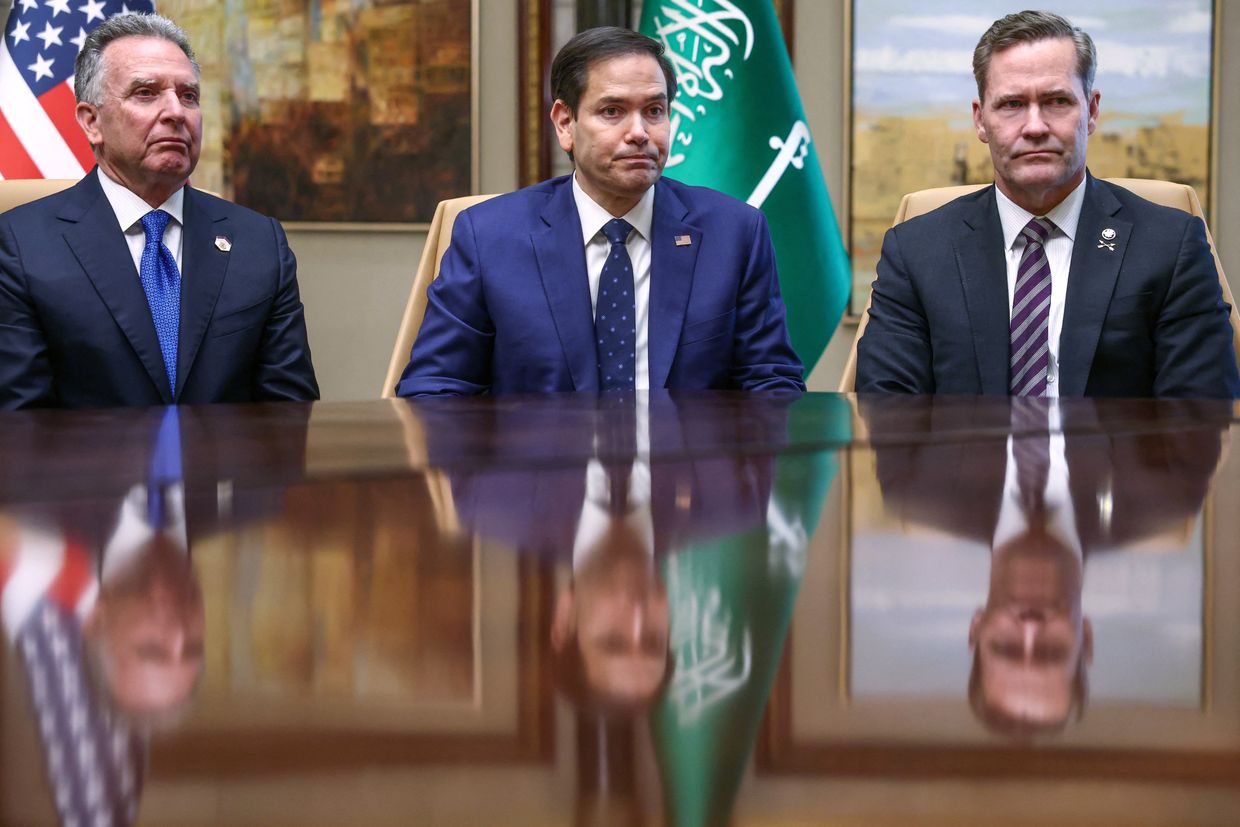Ukraine summit in Paris exposes divisions, lack of coherent plan, experts say

French President Macron meets UK PM Keir Starmer at Elysée Palace, Paris, Feb 17, 2025, to discuss Ukraine and European security. (Tom Nicholson/Getty Images)
The emergency Ukraine summit held in Paris by European leaders on Feb. 17 exposed divisions between European countries, highlighting how they have so far failed to agree on a coherent plan for supporting Kyiv, analysts have told the Kyiv Independent.
French President Emmanuel Macron convened the summit after Brussels and Kyiv were sidelined from negotiations in Saudi Arabia on ending Russia's war in Ukraine, as concerns mount that both Europe and Kyiv may be left without U.S. support.
Adding to tensions on the continent, U.S. Vice President JD Vance stunned those watching on Feb. 14 when his speech at the Munich Security Conference turned into a searing attack on Europe's ideals and a call to embrace far-right political parties.
"This is the EU’s final call to show leadership," Federica Mangiameli, defense and security senior programme manager at Globsec, told the Kyiv Independent.
"It is time to honour the promises the EU has made, for Ukraine, for Europe and for all of us believing in a democratic free world."
The Paris summit was attended by leaders of Germany, the United Kingdom, Italy, Poland, Spain, the Netherlands, and Denmark.
The participants considered increasing defense spending, providing security guarantees to Kyiv, and sending peacekeeping troops to Ukraine.
Speaking after the summit, Macron reaffirmed the need for strong security guarantees for Ukraine, warning that a ceasefire without them risks collapsing like the failed Minsk agreements.
"Europeans must invest better, more, and together in their security and defense — both for today and for the future," he said in his statement on X.
Yet there were no concrete agreements, and little consensus among statements issued by others in attendance.
U.K. Prime Minister Keir Starmer said that he is "prepared to consider committing British forces on the ground, alongside others, if there is a lasting peace agreement."

But German Chancellor Olaf Scholz argued that it was "highly inappropriate" to discuss sending peacekeepers before a specific peace plan is approved.
Here’s what seven European experts think about the results of the Paris summit and what Europe should do next to support Ukraine:
Jeremy Shapiro
European Council on Foreign Relations
Looking at the outcome of the Paris meeting, it is still clear that Europeans do not agree on how, and to what degree to support Ukraine, particularly if they need to defy the United States to do so. This extends to issues beyond just the headline question of deploying European troops to Ukraine and extends to issues such as security guarantees, the level and kind of military assistance, reconstruction aid, and even the definition of victory.
Unless and until they reach such agreement, Europeans will not have much if any say in the negotiations. Whether they feel they need that and whether they are willing to put in more resources and make compromises with their EU partners is, I guess, a question they need to ask themselves.
Hanns Maull
a researcher at the German Institute for International and Security Affairs
We Europeans still have difficulties accepting that — at least for now and for this presidency — the United States is no longer a reliable ally, and is possibly even an opponent.
Regime change has happened in Washington, however, and the informal summit in Paris tried to come to terms with the implications — that Europe will have to do a lot more to support Ukraine.
The emphasis here is on "do," rather than just "say" things that help Ukraine. Europe's problem is that it will find that difficult even if it wants to support Ukraine, beyond providing money — too many countries in Europe have neglected their defenses and their defense industries for too long.
Rafael Loss
a defense and security expert at the European Council on Foreign Relations
My sense is that European leaders are converging on a set of financial measures to mobilize additional money for defense. The goal is to allow European states to boost defense spending to build up their own armed forces and sustain military aid to Ukraine as US support for both Ukraine and European security more broadly is perceived to be crumbling.
Two big questions remained unanswered in Paris on Monday. One, will Europeans deploy troops to Ukraine, under which conditions, and with what mandate?
And two, what is the right balance to strike between favoring the European defense industry to assert greater sovereignty from the U.S., and procuring equipment from the U.S. to keep the Trump administration engaged in European security affairs?
We’ll probably learn more next week after Germany’s Feb. 23 federal election. It seems that the democratic parties of the political center have agreed on the contours of a plan to reform Germany’s debt break to boost defense spending sooner rather than later and to expand Germany’s role as a key security provider in Europe.
But they’re keeping their cards close to their chest to not add fuel to the populist fire being stirred by the far-right and far-left parties, both of which are decidedly pro-Russian.

Pavel Havlicek
a research fellow at the Association for International Affairs
The meeting was a clear political reaction to the Munich Security Conference that brought some bad news for the EU and Ukraine, and demanded a political follow-up at the highest level.
Only some of the EU countries were invited, especially those that are prominent and powerful enough as well as capable of delivering financial support and dedication to Ukraine.
But the results are mixed, exposing the existing divisions among the EU countries and states that want to join the peace-keeping efforts in Ukraine, and those that remain rather lukewarm on this. At the same time, the wide consensus was on more military spending and investments as well as maintaining political unity and a strong Transatlantic bond.
At the same time, it is clear that Europe needs both more time and vigilance to respond to the ongoing challenges, and to stand up to the challenges from Russia and more pressure from the United States too.
This is both the case when speaking to the general public in the EU as well as when securing additional financial support, investments, and more projects and military capabilities.
Susan Stewart
a senior fellow at the German Institute for International and Security Affairs
Yes, Europe certainly still needs to do much more. My expectation from the meeting on Monday would have been that the participants agree to come up with a draft plan within the next week or two of how European countries can provide security guarantees for Ukraine.
Since it is unrealistic to do this without some form of U.S. support, the plan should indicate where this support is essential, i.e. what would be the minimal amount of support needed from the U.S. for the plan to succeed. It should also detail what the Europeans are able to provide.
This needs to be a realistic assessment but also one which "hurts," i.e. where the European countries leave their comfort zone and pledge to provide the maximum possible support. Even if this requires them to take actions which will negatively affect their own security, they need to do it, because their security is being protected in Ukraine, and if they fail to help protect it there then they will have to sacrifice much more in order to defend it on their own territory or that of allied NATO countries.
Even if (U.S. President) Donald Trump is unpredictable, his statements recently and during his first administration leave no doubt that he expects Europe to do more for its own security. So relying on some sort of vague hope that he might change his mind and continue to provide the same amount of support for European security as has previously been the case is naive and dangerous.
Unfortunately we did not see any sort of plan, or indication of a forthcoming plan, coming out of the meeting in Paris. European leaders need to realize that in order to have a seat at tables they consider relevant for them in the future, they will need to back up their rhetoric with much more convincing action, and they will need to begin immediately.
Federica Mangiameli
defense and security senior program manager at Globsec
The interesting decision not to invite all EU leaders was poorly received by the rest of the bloc, once again providing figures like (Hungarian Prime Minister) Viktor Orban and (Slovakian Prime Minister) Robert Fico with an opportunity to push narratives of conflicting interests and divisions among EU member states.
The real danger here is that public perception may shift toward believing in a division within the EU — between "warmongers" and "peace supporters."
At this stage, rather than wake up calls, we should talk about "final call" for the EU to prove its voice matters and support Ukraine in the negotiation talks. Years of effort to back Ukraine’s fight for survival would be wasted if a poor deal is reached — affecting the credibility of the EU project for years to come.
This is the EU’s final call to show leadership. It is up to (EU Chief) Ursula von der Leyen to engage with the U.S. and ensure that any agreement reached serves Ukraine’s best interests — rather than merely ticking an item off a diplomatic to — do list.
It is time to honor the promises the EU has made, for Ukraine, for Europe and for all of us believing in a democratic free world.
Kai-Olaf Lang
a senior fellow at the German Institute for International and Security Affairs
The summit in Paris produced a message, but not a result. The message is that European states are able to come together swiftly and that they are aware how challenging the situation is.
The leaders who gathered wanted to demonstrate that they are ready to act – which is supposed to be a signal to Washington that Europe has been active in supporting Ukraine and is prepared to assume more responsibility for Europe’s security. By communicating this, the countries and institutions assembled in Paris hope to become involved in the talks or later ongoing negotiations on ending the war. It is not surprising that the meeting did not bear fruit immediately.
Even though the meeting brought together like-minded countries from the EU plus the UK, top EU officials and the NATO secretary general, divisions even among important European countries continue to be visible – some countries are reluctant to find new, common ways for defense spending, and some are hesitant when it comes to the possible deployment of soldiers in Ukraine.
Nevertheless, the dynamics of US-Russian talks will act as a catalyst for the EU and other European countries to speed up their activities. Also, the European Commission will present some new initiatives soon and it will try to find a solution for a new defense fund.











